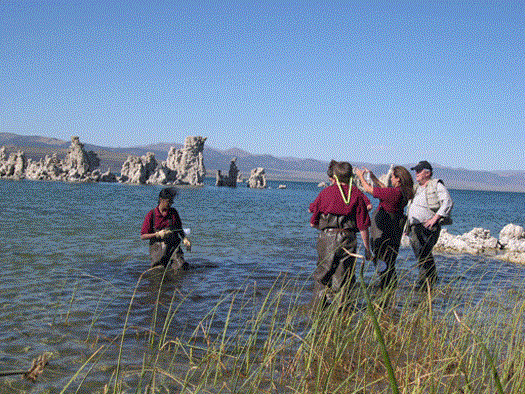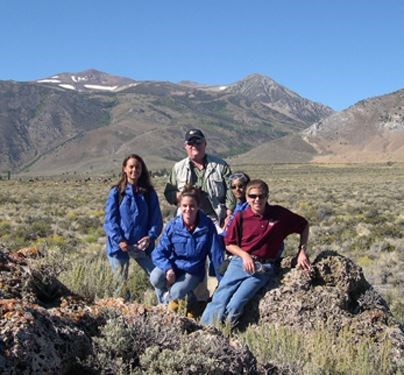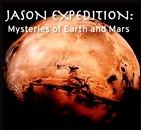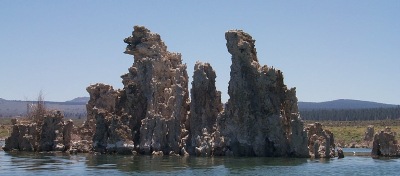Mono Lake, CA
"It was amazing to see how down to earth these scientists were. The scientists explained everything to us even if it was the simplest thing to them. They were very easy to talk to. " - Meera, student Argonaut
 |
JASON Student Argonauts (R to L) Meera Gudavalli, Andrew Young, and Megan Shaffer; Teacher Argonaut Danielle Renz; and Arizona State University Astrobiologist Jack Farmer collect water samples from Mono Lake in California. |
 |
The JASON research team at Mono Lake in California. (L to R) teacher Danielle Renz, student Megan Shaffer, Arizona State University Astrobiologist Jack Farmer, student Meera Gudavalli and student Andrew Young. |
 |
Meera is talented and active in a number of programs. She has played piano for five years, has participated in the National Junior Honor Society at her school, has volunteered for four years at the Multiple Sclerosis 150 Bike Tour, and is a black belt in Tae Kwon Do.
How did you become involved with the JASON Project? How does it feel to have been selected as an Argonaut?
I became involved with the Jason Project when I went to the Hawaii broadcast at EDS. After that I went to the Jason Universities at EDS and that is when I became actively involved with the JASON project. It was exciting when I read the email that I got accepted. I ran and told my parents and I told all my friends. It was a very difficult application process but it was definitely worth it.
What about you, your background, your life experiences, etc. -- do you feel made you a great candidate for the JASON expedition?
I think one reason is that my parents came from India so I look at things differently than other people. Also I do things differently and I have a completely different background from most people. I also am a straight A student in school.
What do you feel you have learned or gained from this experience?
I have learned many things like how scientists make sure that all results are precise and that nothing was overlooked. Also I learned a lot more than I knew before. Especially I learned about how different life forms can live in extreme environments. I also got to make a lot of new friends from around the country.
What was the coolest thing you did, or learned, throughout this process? What was your favorite part of this experience?
I got to canoe for my first time in Milwaukee. Also I got to snorkel for the first time which was very exciting! One cool thing I learned was that the mussels in Lake Michigan came when ships came across the Atlantic. They did not originate on the lake. My favorite part was being able to meet so many people and getting to learn math and science hands on by actually going places and learning about the subjects.
What was it like working with these amazing scientists and educators?
It was amazing to see how down to earth these scientists were. The scientists explained everything to us even if it was the simplest thing to them. They were very easy to talk to. I learned a lot about how these scientists worked and what it is exactly that they do.
From what you have learned so far about the JASON Project, what do you think of it?
I think it is an excellent experience for all students to try and be a part of. Even if you aren't an Argonaut there are many things you can learn from the Jason project.
How do you feel about the expedition you participated in? Can you tell us how this particular expedition can be a good learning tool in classrooms, or for other kids?
I feel this expedition was incredible because it was about Mars and I really like studying space. It can be a good learning tool in schools because there is a lot that kids can learn like what exactly defines life. Also kids can learn how life adapts to harsh environments. This and much more is part of the expedition.
What is your favorite subject in school? What are your hobbies?
My favorite subjects in school are math and science. I like to play basketball and I play the piano.
Who is YOUR hero?
I would say that my mom is my hero. She is a loving and caring person. She is always there when I need her. Also she doesn't let anything bring her down. She is a strong woman and I would like to become like mom some day.
What else would you like to tell kids around the world about yourself, or your experience as an Argonaut, etc?
I would like to tell everyone that this had been an awesome experience! Everyone should try to be part of it because there is so much to learn. Even if you don't become and Argonaut you can watch the broadcasts and you can learn the Jason curriculum. It is a very exciting experience!
 |
Host Researcher, Dr. Jack Farmer
Arizona State University Astrobiologist, Dr. Jack Farmer, served as Host Researcher for the Mono Lake expedition. He is deeply committed to learning about past and present habitability on Mars, and is on a quest to understand the possibility of extraterrestrial life. He approaches this by studying microbial life over a range of extreme environments, and working with modern and ancient Earth analogs. He is also a participating scientist on the Mars Exploration Rover mission and is interested in the geology and astrobiology at each of those landing sites.
How did you end up in the field you are in today?
After attending high school, I headed to Junior College and during the first semester I declared my major as Geology, not really knowing what the field encompassed.... The first big decision was to go to College. I am the first in my family to do so and I had a fairly limited set of options, mainly because of money concerns. Early on I had to choose between a musical career and being a scientist -- a tough decision. However, I had always had a keen interest in nature and wanted to be a teacher, so becoming a scientist became my main goal. I attended a junior college first, and then headed to State. I kept working hard and focused intently and eventually achieved a Ph.D., something I never dreamed possible.
What do you like best about your job?
The work is very exciting! Getting up in the morning to go and explore Mars with a rover has been particularly inspiring. Each day offers new challenges that require deep thought and creativity to find solutions. This keeps things interesting! In addition, I love working with students and enjoy the challenge of communicating scientific ideas.
What has been the most incredible thing that has happened to you while conducting your work?
The strangest things that have happened include hearing the underwater sounds of the Weddell seal while diving under sea ice in Antarctica and bobbing like a cork while trying to sink myself, my wetsuit, and my tanks while SCUBA diving in Mono Lake. It has such high salinity (salt content) that you almost can't sink!
Why do you think it is important for students to learn about our solar system and Mars?
Mars and other bodies in our Solar System reflect the basic processes and history of our neighborhood of the Cosmos. I don't know about you, but I have always considered getting to know my neighborhood essential for a happy life. These planets are also our doorways to other possibilities for life: this precious, tenacious process which we embody and which drives us to pursue fundamental questions about the Cosmos and our place in it. I think that by asking such questions, it helps us to understand who we are and our responsibility to life, the Earth and the general pursuit of knowledge and understanding.
What would you most like students to learn from participating in the JASON Expedition: Mysteries of Earth and Mars?
I'd love students to come away feeling the excitement of scientific creativity and discovery and the fulfillment that comes by communicating these ideas.
What advice would you give to students who are interested in studying science?
Study hard, but don't lose sight of the mystery and beauty of what you are studying. Find out what interests you most and pursue your passion relentlessly. Study lots of subjects and learn the language of as many sciences as you can. This promotes your ability to look across scientific boundaries (which are really our inventions) and engage other scientists in fields outside of you own. New discoveries happen at the boundaries of our knowledge and often at the edges of disciplines.
Page created on 8/16/2014 6:22:31 PM
Last edited 8/16/2014 6:22:31 PM

For over a decade JASON Expeditions have taken place around the globe.

2005's JASON Project expedition, “Mysteries of Earth and Mars,” explored several different locations around the United States. The student and teacher “Argonauts," along with a team of renowned researchers and scientists, helped "unravel the mysteries of Earth and Mars" as they compared the two planets through exciting scientific exploration!
Scientists know that Earth and Mars share a common origin in the solar system, yet are two planets which evolved very differently. By visiting locations on Earth whose environment could best be paralleled with that of Mars, and which, despite extreme conditions, have life forms thriving therein, the JASON team was able to theorize about the types of life that could potentially exist in the extreme conditions of 'the red planet' as well.

Once erroneously thought to house no life forms thanks to its extremely salty conditions -- twice as salty as the sea! -- and 'alien' appearance, the lake does, host creatures -- trillions of them, in fact! -- from brine shrimp, to 'scuba-diving' flies that navigate the lake in tiny submarine air bubbles, to countless microorganisms. It is the microbes, in particular, that are of most interest to astrobiologists since these "extremophiles" are able thrive where larger life forms like humans, or even fish, could never survive.
Through their research, the team learned about the use of tools of microbiology and molecular biology for identifying microbes that are present in modern ecosystems -- and how the ability of these resilient life forms to survive amidst extreme conditions, may help answer the question of extraterrestrial life. Basically, by studying the microorganisms found in such 'extreme' places on earth, like Mono Lake, scientists can better understand how life could potentially exist on Mars, despite its own harsh 'alien' environment.